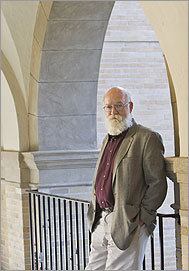Walk into a church on a Sunday and you might find that a few of the people in the pews are atheists � there because they like the old hymns or the comforting murmur of the liturgy or because their spouses insist. Or because, at some level, they�re still pretending they believe. They are spectators, in other words, not participants.
But what about the person leading the service? How likely is it that a member of the clergy might be an atheist as well � delivering the sermon and choosing the Bible passages, and afterward paying house calls to offer spiritual counsel to those in trouble and doubt, all without believing in God?

Daniel Dennett decided to find out. A leading philosopher of consciousness, a Tufts University professor, and a famously outspoken atheist, Dennett has for years been curious about the phenomenon of nonbelieving clergy. And now, working with a researcher and clinical social worker named Linda LaScola, he has embarked on a project to find and publicize their stories.
He doesn�t yet have data on how common the phenomenon is, but last month Dennett and LaScola published their first anecdotal results, a paper that appeared both in a scholarly journal, Evolutionary Psychology, and on The Washington Post�s website. The paper is an annotated set of excerpts from interviews with five ministers whom Dennett and LaScola found through personal contacts in the clergy, seminaries, and progressive Christian and atheist organizations. Unlike most of the clergy members the researchers contacted, these five agreed to tell their stories publicly, albeit under pseudonyms and with personal details changed.
What emerges is a portrait of men (the one woman interviewed backed out at the last minute) grappling earnestly and incisively with the sort of theological quandaries familiar to anyone who has studied and doubted Christian doctrine. Just as strong, though, is the sense of secrecy and evasion that pervades their lives: having to hide their lack of belief from parishioners, friends, even family members. Some spoke of feeling trapped: questioning their fitness for the pulpit but unable to leave because of a mix of personal, cultural, and even financial reasons.
�She doesn�t need to hear this right now,� one says of his wife. �It�s not going to serve any of us. I feel like when the time�s right, I can talk to her about it. She won�t like it, but I will share it with her. And after I share it with her, I will start sharing it with other people.�
Dennett says his ultimate goal is a far larger study to give a true sense of how prevalent nonbelief is among the clergy. In the meanwhile, Dennett and LaScola are collecting stories one by one.
Ideas reached Dennett by phone at the Santa Fe Institute, where he is currently a fellow this semester.
IDEAS: How did this project come about?
DENNETT: When I was working on
�Breaking the Spell,� I went out of my way to interview deeply religious people, including ministers, so I could learn more about how they think and how they talk. What stunned me was how many told me, in deep confidence, that they really didn�t believe any of the creed.
IDEAS: What was the point of doing the study?
DENNETT: The point is that this is a dirty little secret that many people in the church know but the general public doesn�t, and we think it�s important and we think it�s interesting.
IDEAS: What sort of response have you gotten?
DENNETT: Some of the response that we�re getting is that this can be the spearhead of a new movement to open up the churches to more liberal thinking so that really good people who don�t happen to share the creed can participate and lead the churches. We�re also getting feedback that is incredibly hostile to the clergy � not to us but to the clergy. I think that�s not surprising, but I think it shows an incredible anxiety.
IDEAS: Anxiety about what?
DENNETT: About the fact that our preachers are right, that they are the tip of the iceberg and we�re letting the cat out of the bag. The argument is that these pastors should have buttoned their lips...like Teresa.
IDEAS: Mother Teresa didn�t believe in God?
DENNETT: When her letters were published three years ago, it revealed that for 50 years she had no sense of faith in God at all. She was in private agony, meeting with spiritual advisers, and it was �the dark night of the soul� for her for all those years.
Drake Bennett is the staff writer for Ideas. Daniel Dennett and Linda LaScola are continuing their interview project and can be reached at lindalascola@gmail.com.
� Copyright 2010 Globe Newspaper Company. Continued at link above.